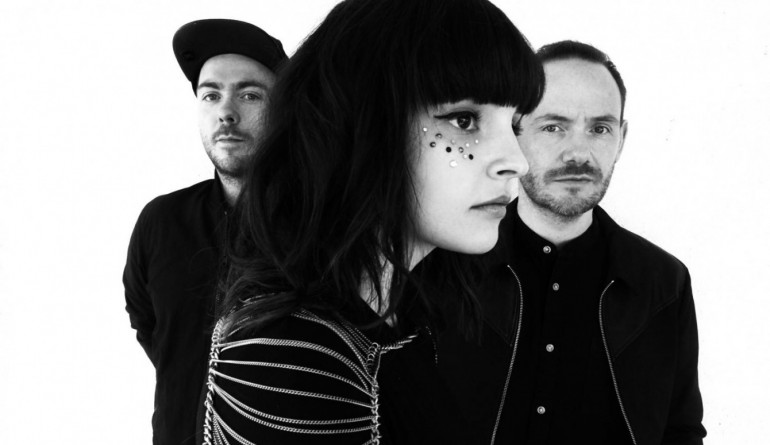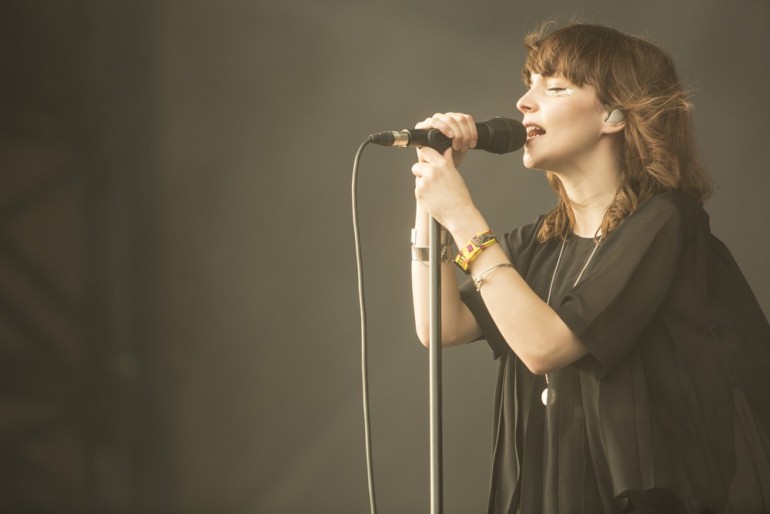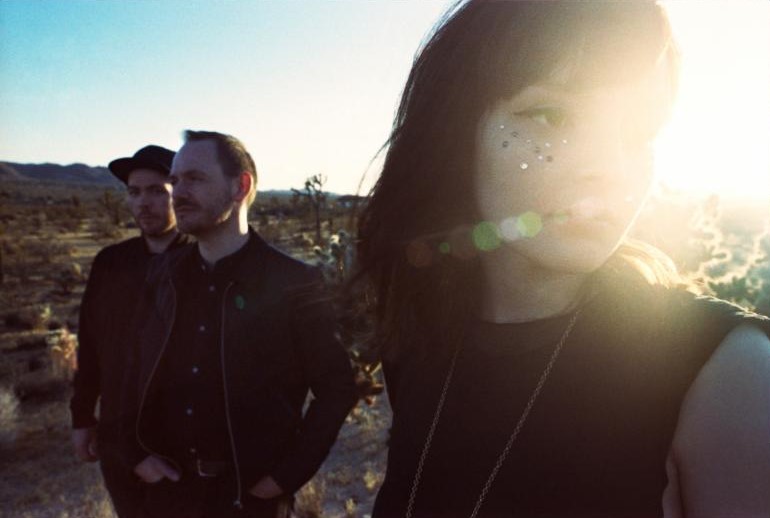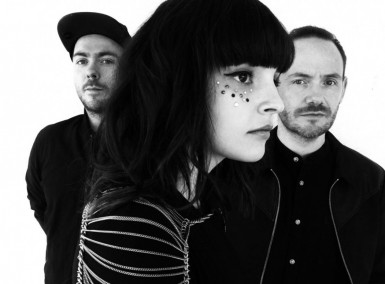
Photo by Danny Clinch
Barely two years into CHVRCHES major musical breakthrough with the album The Bones Of What You Believe, NOTHING BUT HOPE AND PASSION checked in with Lauren Mayberry, Iain Cook and Martin Doherty again just a few weeks ahead of the release of their follow up album Every Open Eye as they passed through Berlin for the Lollapalooza festival. Despite all their recent acclaim and success, we found the Scottish trio just as ‘personable, hopeful and down-to-earth’ as ever; a band who blatantly describes the awe-inspiring effect being on the road with DEPECHE MODE had on them. One gets the impression that CHVRCHES is a group who not only knows who they are, but a group who undeniably ARE who they are: a charming, hard-working threesome fighting to balance he dark and the light blessed with an angelic singer who is even able to sum up the zen of a working weekend existence all in one GIF.
Alright guys, NOTHING BUT HOPE AND PASSION last met you two years ago so we’re checking back in and maybe even following up with a few things we’d asked you then.
Iain Cook: Ahh. This is where I’ll trip myself up! (laughs)
You have been really busy for the past two years. At that time you said you didn’t write much on the road – has that changed? Has that workflow had to change?
Martin Doherty: You have to evolve slightly. I demoed a bunch of stuff but we didn’t use any of it for the album. We wrote almost everything in the studio. It still feels better because then we are all working together. When we are working on the road we are working separately – which is awesome but it doesn’t really but it doesn’t really come alive properly until we all start having an opinion on it. It partly evolved but that was more about just flexing those muscles in the back end of the campaign so that we weren’t going into this intense period of creativity cold, you know?
With your sophomore record have you had the stereotypical anxiety or pressure in making the follow up – especially after the wave of success from the first album?
MD: It is undeniable that there are external factors or expectations. The way it affects expectation is usually what gets people on the second record, but we are tight enough as a unit that none of that stuff ever became an issue. It was definitely on our minds before, but that had more to do with the fact that we hadn’t sat down in a room together and worked together. Those anxieties were personal ones. They weren’t really based on what the outside world was saying. Privately we never even really talked about it, but I think in the back of all our minds we were thinking: ‘It has been two years. What has changed? What If I have changed? What if You have changed? What if it was just a fluke? What if things are just different now?’ In that first day, first two days, first week things started moving really really quickly and suddenly we were completely zoned back in where we were first time around again and not worrying about any of that stuff.
The last time we checked in on you you had just posted a cover of BAUHAUS’ Bela Lugosi is Dead – so maybe I was expecting something with more of a tinge of darkness to it but the way your sound hits the listener on this new album for the first time it really has this overtone of positivity. Where does that come from?
Lauren Mayberry: I can see how people would interpret the album differently and we are conscious of wanting to balance the light with the dark. We never want anything to be too deliberately obscure but also we don’t want anything to be too shiny and clean, so I think it is just nice to juxtapose those things against each other and tread a line between pop and not quite.
IC: There is a thread of melancholy – not darkness – that runs through this record and that is something that is a bit of a trademark for us, like Lauren said:
Balancing out the sweet and sour, happy and sad.
But, yeah, we haven’t gone full goth yet – but maybe album three… (laughs)
MD: I think all that stuff is really a product of our personalities over everything else. We are people who exist in that positive/negative balance. Maybe it is a Scottish thing, maybe it is just the way we are as people… who knows?
When you say ‘Scottish thing’ how might you flesh that out?
MD: Scottish people are really really personable, hopeful and down-to-earth but at the same time they have a deeply melancholic streak. Sometimes it manifests itself in an aggressive way.
IC: Or alcoholism. (laughs)
MD: Yes, sometimes people drink it away or whatever. I don’t know why it is or where it comes from but it is just one of those things you grow up with your entire life so it comes to be second-nature to you. Maybe there is some of that in there on some level, I’m not sure…
LM: When I listen to the album it has some of the darkest lyrics we’ve ever written, but it also has some of the most hopeful, forward-facing things. It is nice for al those songs to exist on one album and feel thematically connected because I don’t think the human experience is one thing of the other. Nothing is ever completely bright all the time but hopefully never completely dark and people flip from one thing to the other a lot and I think talking about all those things in the one context feels authentic to me.
MD: The song Downside to me is the darkest song on the album, but it is still very much hopeful – it doesn’t wallow. There has always been that balance in what we do. Even when we are trying to write something moody and really bleak and hopeless, thematically that is still a pretty hopeful song. Maybe we’re just super positive?
LM: And we don’t realize it! (laughs) Maybe we’re really up-beat and we just don’t know it.
MD: Like, we can’t recognize it?
Or maybe we’ve already gotten the dark, fucked up depressing music out of us already.

CHVRCHES perform live at Lollapalooza 2014 (Photo by Cambria Harkey)
IC: When you get people like us making music that sounds like it does in a way it is kind of therapy. I think that is what draws other people to it as well. You might be living in a dark place, but you are looking outside of that and thinking of making things better and transforming things into positivity. You can tell that – the difference between listening to somebody living in California writing sunny pop music and somebody writing kind of poppy-er music that comes from a darker place both geographically and emotionally. It gives it that weight, that depth that you don’t get from the Top 40 shite… shiny shit.
MD: Like all those bands are massive in LA with 4,000 capacity venues in LA and nowhere else. People outside of LA can’t relate to that music. That’s not the real world for anyone else but it is for the people who live there and live in it. I wouldn’t name names but you get them – those bands that are huge in California or just huge in LA even but it doesn’t translate because its not the reality for anyone else. It doesn’t feel authentic to anyone else because everyone else is like: ‘WHOA. Life is actually quite shite a lot of the time. It’s not this perfect ideal’ – and maybe that is where we’re coming from.
‘The idea of what is ‘Emo’ has changed a lot’
When you came to prominence few years ago I couldn’t quite figure out whether you were born of the internet… or some garage somewhere? You just never know now. Upon closer inspection, however, it was clear that you have an intricate network of roots in Glasgow from previous bands and various projects you have all worked on. What did the scene look like that you came up in or grew up playing in, for example?
MD: In the scene I came up in, for example around 2005-2006 we were dressed entirely in black – even though I am dressed like that now – listening to Emo, probably listening to bands like THE FAINT and Saddle Creek was a really big thing in Glasgow weirdly. There was also a lot of math rock that still went on. In every band there was always some guy who was trying to be BRIGHT EYES in Glasgow for a minute – but I guess it was like that everywhere. It was pretty regular. For a town with such a reputation, Glasgow is not big, not huge, and the scene is pretty small but for whatever reason it seems to keep producing these bands that go on and get out of there or get bigger than the scene.
LM: Now when you look at it there are a lot of different kinds of bands with a lot of different kinds of music being made but in terms of actual venues you can play it isn’t huge. We all kind of came up in the Glasgow scene but a couple years behind each other, so we’re kind of staggered. I came in last but I was still listening to I used to be in a band called the BLUE SKY ARCHIVES which is how I met Ian – he recorded an EP for us. But the way I started that band was by being in a pub and someone said ‘Hey, you should talk to Paul – he loves Saddle Creek, too!’
MD: The other guy from Glasgow!
LM: And we just thought: ok, we’ll just start that kind of alternative rock band – its not Emo but it has got an emotional core in the lyrics. I suppose the idea of what is ‘Emo’ has changed a lot. To me Emo is loads of different things, it could be RITES OF SPRING, you know – disco-Emo, or folky Emo but basically the thread that runs through all those things is emotional content. To me that is not a bad thing, and it always connected to me as a teenager and still as an adult. People are like: you’re a grown up now, you can’t have emo anymore – but you can inside, you just have to wear different t-shirts.
Less black? Once you first started playing shows outside your sphere of Glasgow were you surprised to see who was showing up to your shows?
IC: The first shows we really played further afield was when we went to the states for the first time. That was a really eye-opening experience. Seeing people who knew lyrics to the songs online way before the album even came out. It was like: ‘Oh, shit! This is a thing…’ Then we just thought it was American crowds being over-enthusiastic but we soon figured out that it wasn’t that way at all.
MD: That was the first time I really blown away and was sure that the band was going to go bigger than we were. That Independent show in San Francisco. It was the first show we played in the states and it was the first time we’d seen a reaction like that. The only shows we had done up to that point were well-attended, they were selling out but it was more like a lo of people who were there out of curiosity than anything else. When we went to America was when we say really pure reactions for the first time and that was mind-blowing. That was when we were thinking: ‘Oh. OK. Maybe this is really going somewhere. Maybe we really do have a career beyond the first nine months or whatever.’ Beyond that first song that blows up on the internet… maybe we won’t disappear in a week, you know?
LM: I like that when we play shows now if we look at the front row it is one of the strangest mixes I have ever seen – but in a really great way. When we first started playing shows because it was being written about in a lot of blogs – as Martin says it was quite a specific Person who was coming to the shows, and now you still hopefully have the blog kids and the college kids but there are 16-year-old girls and 40-year-old guys who love DEPECHE MODE. I like that. If something can communicate with people in that way and they are not thinking about: oh, what box does this fit in? Maybe this isn’t something I should be listening to… but it is just connecting with them regardless of those kinds of constraints, I think it is really cool, and it makes for a much better show from our point of view. The people are just there because they want the music and they have taken that music into their lives, they’re not there to be seen.

DEPECHE MODE come up twice already, and when I was thinking of some initial impressions I could pin on the sound of some of the songs on the new album – not necessarily directly, but indirectly – I was thinking: early DEPECHE MODE…
MD: They’re a huge influence. That was the band that defied the idea of… (long pause) I guess that stuff gets imprinted on you. On all of us. As writers, as producers. We opened for them for a minute there – four shows in Europe in stadiums, not that they’re a stadium rock band but they were sold out and there were people losing their shit. But this wasn’t BON JOVI, you know? This is music with real emotional content. This is music with deepness that was authentic and soulful. That was probably the most inspiring thing I’ve ever seen as a creative trying to channel or figure out what it is that you channel to make your music translate to people on that level but without ever compromising the emotional content and the authenticity. That is STILL the conversation we have. That still comes up. We think about it when we are writing.
LM: You spend all your time writing music that you put yourself into but you always hope that it connects with somebody. Before people came to a show and would say: ‘good gig!’ and that was pretty much the end of the feedback. I have never really been in a situation where you can see what you are making resonate with people in that way. It is insane when people come and talk to you and say how much your music meant to them and why… I just never thought I would be that band, and that is an incredible privilege – to be allowed to do that. Even today we were in the airport and we bumped into two guys from Glasgow and it was the guy’s 21st birthday and they bought tickets to Lollapalooza to see the show and I was like: ‘all the way HERE? For US?!’ That is kind of mad… but I travelled to see bands I really loved when I was younger and I probably still would now, you know? It is just weird to be on the receiving end of that. To be the band who has been taken into people’s hearts like that… you should never take that for granted… SEE? Emo! (all laugh)
MD: (laughing) Maybe we are just Emo? Maybe I am just realizing that now…
IC: The feeling of kinship with a band – DEPECHE MODE as well – is extended by how they can straddle genres. They came in and they were pretty much a full-on pop band at the start, but they morphed into something a lot more weird and electronic and you could never call them a ‘pop’ band now – you can’t really call them a rock band either. They exist in this world between the two and I think that is a really good place to be.
‘You always get us in the middle of the intensity and horror that we are standing on the brink’
Because of the proliferation of software I was actually surprised to find out that you were using a lot of analogue synthesizers to create your music. Does your stage show involve a lot of those same analogue synths as well?
IC: We have three analogue synths onstage and one analogue-digital hybrid which is a new addition to the setup. On the first record we toured with Moog Voyager Prophet 8 and a Juno-106 and we have added a Prophet 12 this time because we used it a lot on the record and it is one of the most flexible and versatile synthesizers that you can get that isn’t one of those big work station things that have kind of landed. Even though we didn’t have all of the synths that we used to make the record at our disposal on stage we find that with the combination of those four we can get most of what we need out of it – to reinterpret the songs.
Ok, here we are – two years later, and with a bit more experience under your belt now: what do hope and passion mean to you?
LM: We were probably a bit Emo about it last time… you always get us in the middle of the intensity and horror that we are standing on the brink…
MD: I probably said something really Emo, like: ‘Hope is dangerous… and passion is everything.’
IC: Remember that time when you were like: ‘Its just ignorrrant…’
MD: Yea, yea, yea. (all laugh) I think it is more important to focus on the stuff that you can change and have an effect on in your day to day that it is to be looking forward all the time. Not at the expense of having goals… life goals… but always hoping for something better is almost an admittance that you are not happy with what you’ve got.
IC: Completely misplaced… could destroy your life.
MD: Passion is at the center of everything that we do. Emotionally, creatively, professionally. If we didn’t have passion for what we did on this level then we wouldn’t do it. There would be no point.
IC: We wouldn’t be here.
MD: We’d be doing it for money, and there are other ways to get money, you know? It has never been about that for us.
That is nice to hear.
LM: (laughs) Oh, we’ll see – you talk to us in two years time and we’ll all be fur coats and –
IC: (falsetto) I just wanna get paaaiiiddd!!! (all laugh)
LM: – we’ll be having fans removed from the lobby. That’s when you’ll know we have changed. When we’re like: ‘fuck those kids!’ (all laugh)
It happens.
Lauren: Its is SAD, though, when it happens!… On a positive note my friend sent me this GIF of, like, a cat… and Shaquille O’Neal… they were like: ‘Happy Friday!’ And here I am looking down the barrel of a gun at a serious work weekend… and I think: am I the cat? Am I Shaquille? I don’t know. Am I all of the above? Be the cat. Or be Shaq. Or both.
—
